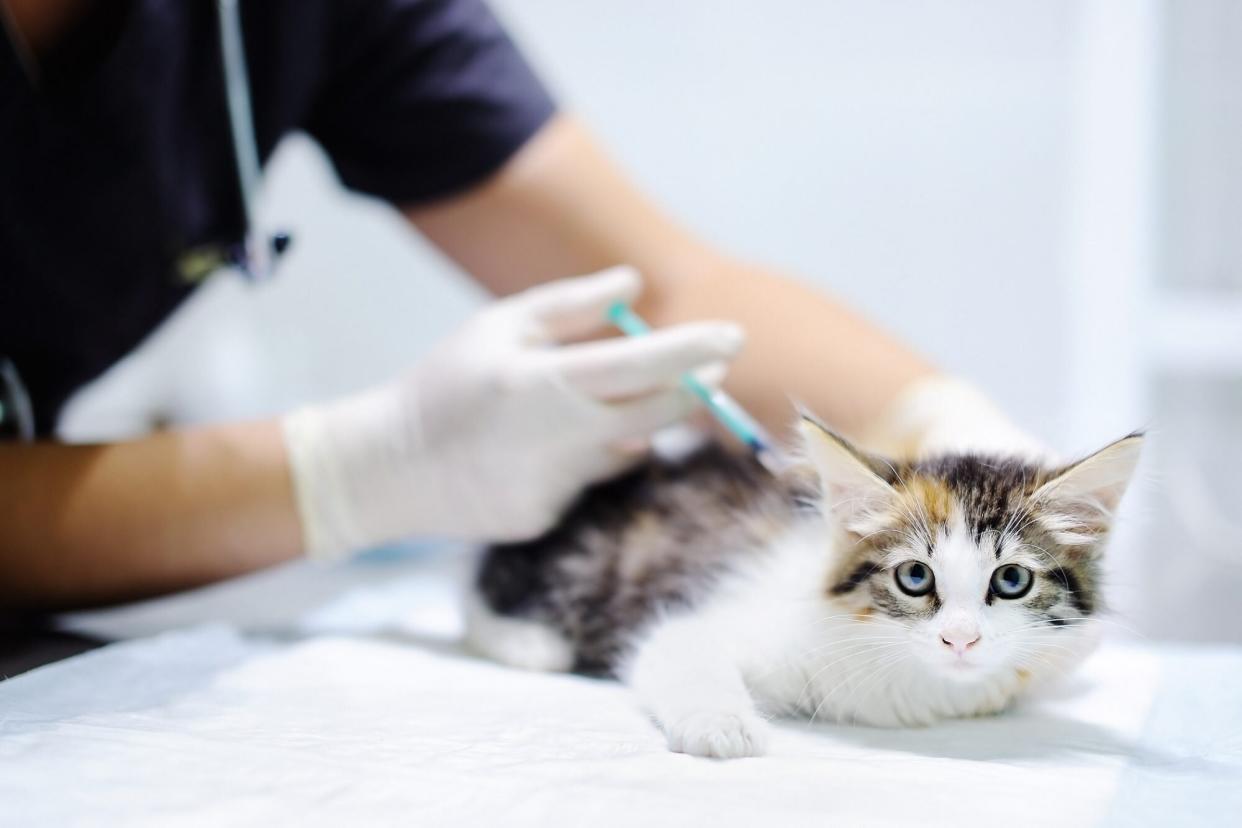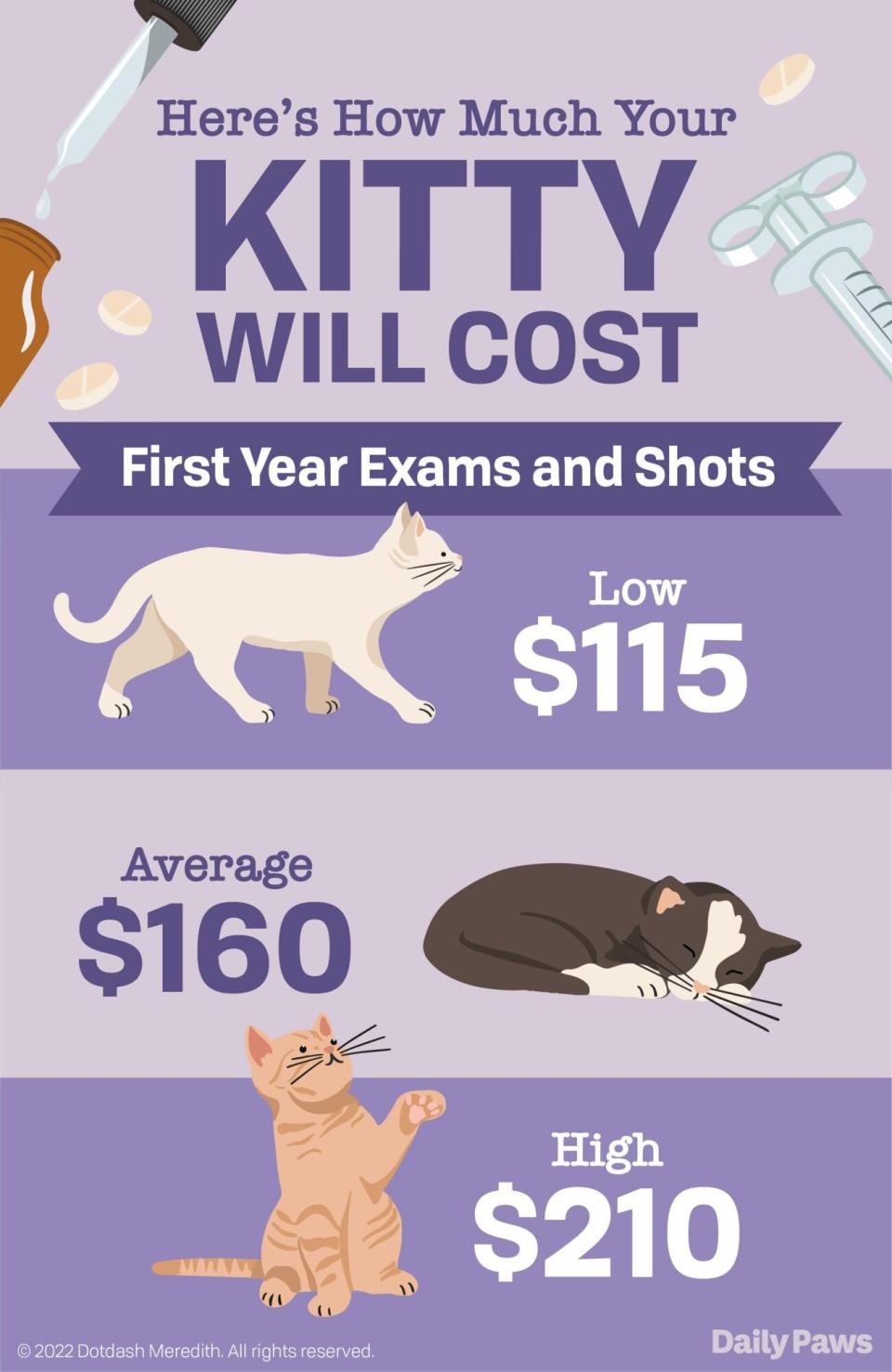How Much Do Cat Vaccinations Cost? Here's What to Know

SbytovaMN / Getty
TABLE OF CONTENTS
On This Page
The Vaccinations Your Cat Needs
Core Vaccination Costs
Optional Vaccination Costs
Additional Vet Service Costs
Low-Cost Vaccination Clinics
Pet Insurance
When you initially hold that precious fuzzy feline face between your hands, you make a vow to ensure their well-being for life—and that means covering cat vaccination costs.
You'll always pay a little more in the first year of vaccinations—about $100 to more than $200 depending on your kitty's situation and the prices in your region—but it's worth it to make sure they are protected from diseases.
Together with your veterinarian, you'll create a preventative care plan for your cat depending on their current health and how much time they spend outside. You'll find out how much cat shots cost as well as which boosters are required and when. Annual exams should always be part of the healthcare budget, too, but they're separate from the fees for cat vaccinations. A veterinarian wants to make sure your cat is as healthy as possible before they receive their shots.
The Vaccinations Your Cat Needs
Most kittens receive their first round of vaccinations when they're 6–8 weeks old. Your cat's vaccination schedule will last until they're 16 weeks old, depending on how many more boosters or additional vaccines they need. A booster is an additional vaccination given after a previous vaccination to help maintain or increase a protective immune response. This schedule is imperative because kittens gradually lose the protection of their mother's antibodies. Once they're 1 year old, your vet will implement a different vaccination structure.
Your cat's vaccinations are based on whether kitty spends their time indoors, outdoors, or both, according to Bonnie Bragdon, DVM, MS, co-founder and president of the Independent Veterinary Practitioners Association. Neutered, vaccinated cats who mostly stay inside are unlikely to get infected with disease. Meanwhile, she says vaccines might not be enough to protect mostly outdoor kitties—who might fight other cats and face higher exposure to infection.
Bragdon recommends these vaccinations for both indoor and outdoor cats:
Feline leukemia (FeLV), is one of the most common infectious diseases for cats, and it's also a primary cause of cancer. Infected kitties often develop leukemia and lymphoma, and it's incredibly contagious, passed between cats through grooming, bites, and from a mother to her offspring in utero and during nursing.
The FVRCP vaccine series, referred to as the "3–in–1 vaccine," provides protection against seriously contagious and potentially deadly viruses: calicivirus, feline panleukopenia (distemper), and viral rhinotracheitis.
Rabies, a zoonotic disease, is transmittable between animals and humans, and cats "are the most commonly reported rabid domestic animal in the United States," according to Merck Veterinary Manual. Bragdon adds that even indoor-only cats should be vaccinated. "If your cat ever bit a human and wasn't vaccinated for rabies, there could be dire consequences, including euthanasia, to test for rabies infection," she says.
RELATED: Cat Vaccinations: Essential Shots and What to Expect
How Much Do Cat Vaccinations Cost?

Grace Canaan
Calculating the total cost of cat vaccinations is difficult. It depends on each cat: which shots they need (Have they already had some shots? Do they need non-core vaccines?); and where they live (The same vet services have different costs across the country). That said, for your kitten's first year of shots, you can expect to pay a low average of $115, a middle average of $160, and a high average of $210.
Here's what you need to allot for each cat vaccine in the first year:
Feline leukemia: $25–$45
FVRCP: $20–$40
(and again for follow-up applications within the first year)Rabies (one year): $20–$30
Keep in mind, you'll pay $30–$50 for a general exam when your kitten goes in for the first round of vaccines (but this may be higher in some areas).
In your kitten's vaccination schedule, there are FVRCP boosters to complete the series until they're 16 weeks old. You'll pay for each one separately, and exam fees may or may not apply (it depends on your kitty's current health and your vet's recommendations).
Shortly after they're 1 year old, cats switch to annual adult exams, which include core vaccine updates. If your pet stays indoors, Bragdon says two- or three-year updates on most vaccines are fine. However, if kitty is outdoors a lot, your vet will likely recommend annual boosters.State laws also dictate certain vaccine requirements. For instance, some states permit rabies updates every three years, while others require them once a year. Those boosters cost $35–$50 per shot.
Optional Cat Vaccinations Costs
Vets often suggest the following non-core cat vaccinations if you plan to let kitty outside frequently, board them, or have a clowder of cats. Note that the following vaccines are typically only used as part of a control program in a multicat household where infection is confirmed :
Bordetella, another zoonotic disease, is a highly contagious respiratory infection known as kennel cough that cats transmit between each other and can even catch from infected dogs. If left untreated, it might cause pneumonia. The vaccine is frequently administered in stages or as one shot with annual boosters. Cost: $10–$30 per treatment
Feline chlamydia, a bacterial infection that causes numerous eye problems in cats, such as conjunctivitis. Cost: $20–$40 per treatment
RELATED: How Much Does a New Kitten Cost? Everything You Need to Budget for Your Kitty's First Year
Cost of Additional Vet Services
There's more than just vaccines to focus on when it comes to your cat's overall health.
For example, feline immunodeficiency virus (FIV) is a serious cat–to–cat contact disease that compromises their immune system and puts them at risk for other infections. Unfortunately, it doesn't have a vaccine. Bragdon says there used to be one, but it was taken off the market because it wasn't effective against all strains. Instead, some vets do a "combo test" of FeLV and FIV at the same time.
If a cat tests positive for FIV, there isn't a cure, but depending on the stage of illness, they can still live long, happy lives indoors, so long as there aren't FIV-negative cats in the house. Your veterinarian may then recommend twice-per-year visits for infected kitties to make sure they stay ahead of any problem that could develop.
Additionally, during your kitten's first or second visit, your vet will recommend additional treatments, such as flea and tick protection, and a fecal exam to check for intestinal parasites such as roundworms and hookworms. If you live in the southern U.S., it's also possible your vet will also suggest heartworm testing.
Here's what you can expect those first-year additional services to cost:
Fecal exam: $20–$40
FeLV/FIV combo test: $40–$80
FIV test only: $30-$50
Flea and tick prevention: $40–$200
Heartworm prevention: $25–$120
Deworming: $25–$130 (many vets still deworm as not all fecal exams show parasites even when present)
Heartworm test: $25–$50 (if necessary)
During their adult exams, your kitty will receive a check-up, core vaccination updates, a fecal exam, and possibly blood work.
Are There Low-Cost Cat Vaccinations Near Me?
When you adopt a cat from a rescue or shelter, they've usually received at least the first round of basic vaccinations (make sure you have that paperwork for your vet!). However, shortly after you bring them home, plan to take them to your family vet to have a thorough exam and complete the vaccine schedule. Some organizations may provide a voucher that allows you to do this for free or direct you to a specific clinic to have them performed at a discounted rate.
Bragdon also recommends researching local municipal animal control services and private nonprofit organizations to see what short-term assistance might be available. Sometimes local rescues provide free basic services as part of community outreach programs, partnering with veterinarians for special events a few times a year.
You can also consult a nearby veterinary school to see if it offers free or low-cost vaccination clinics as part of the training curriculum. And many vet offices now offer "vaccines for life" easy-payment programs with prior enrollment.Additionally, The Humane Society of the United States provides an extensive list of resources that could possibly help with cat vaccination costs, including discounted veterinary care and sliding-scale income programs.
Does Pet Insurance Help?
Pet insurance is a terrific option to reduce the high price of emergency situations or surgical procedures, and the monthly premiums are generally affordable. However, few policies provide for vaccination costs. Here are two other possibilities: Create a separate savings account for pet healthcare expenses or research different wellness plans that help cover preventative care.

